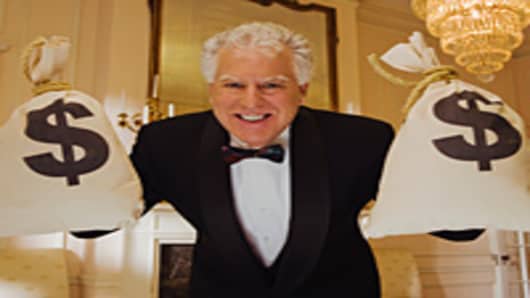Millionaires are more optimisticabout the economy but unlike the rest of us, they don’t blow their whole paycheck on videogames and Little Debbie snack cakes.
Instead, they keep their eye on the prize: Keeping their money — and making more.
A recent survey of wealthy Americans revealed what millionaires plan to do with their money this year.
Their priorities are still to pay down debt and save money: The average millionaire household saved over $39,000 last year, and plans to save the same or more this year, according to a recent survey by Spectrem Group.
But they’re also ready to increase their bets on the recovery: Forty-five percent plan on increasing the amount they have invested in the stock market, the survey showed. The biggest area they plan to invest in is technology (58 percent), followed by the pharmaceutical industry (48 percent) and health care (47 percent).
And the gold rush isn’t over: Forty-one percent said they plan to invest in gold and 24 percent were considering other precious metals.
They may be poising themselves to cash in as the economy grows but they maintain the discipline of monks: Eight-one percent said they don’t believe the recession is over and just two percent consider themselves “aggressive” investors.
That discipline not only applies to how they spend their money but how they live their life and how they navigate business.
Millionaires only have 24 hours in a day, just like the rest of us. What separates them from us is time management. While the rest of us go home and flop on the couch in front of the TV, the wealthy are reading and doing things that contribute to their success.
As a teenager in Seattle, Bill Gates used to sneak out of his house at night and on the weekends to go down to the computer lab. He was doing real-time computer programming by eighth grade. He didn’t spend his high school years watching television and dreaming of studying computer science in college, he spent it actually working on computers. Knowing that, it makes more sense that he dropped out of Harvard to start Microsoft — he was just a guy ahead of schedule!
Apple founder Steve Jobs, in his commencement address to Stanford University in 2005, explained his daily ritual to make sure there isn’t any grass growing under his feet:
“When I was 17, I read a quote that went something like: ‘If you live each day as if it was your last, someday you’ll most certainly be right.’ It made an impression on me, and since then, for the past 33 years, I have looked in the mirror every morning and asked myself: ‘If today were the last day of my life, would I want to do what I am about to do today?’ And whenever the answer has been ‘No’ for too many days in a row, I know I need to change something.” (Watch the speech in this YouTube video.)
Another highly effective habit of the wealthy is that they are decisive.
One of Berkshire Hathaway CEO Warren Buffett’s business tenets is “Never Suck Your Thumb.” That means that, at a certain point, you’ve got to stop thinking — and start acting.
In his 1989 annual report, Buffett explained how he learned the thumb-sucking lesson the hard way: "It's no sin to miss a great opportunity outside one's area of competence. But I have passed on a couple of really big purchases that were served up to me on a platter and that I was fully capable of understanding. For Berkshire's shareholders, myself included, the cost of this thumb-sucking has been huge."
At a certain point, you just have to ask yourself: How’s that couch working out for you?
More Money:
- The World's Coolest Jobs 2011
- The Best Months to Ask for a Raise
- 10 Things You Probably Don't Know About Money
- Jobs That Pay $100 (or More) Per Hour
Questions? Comments? Email ponyblog@cnbc.com or drop a line in the comment box below.
More from The Pony Blog: ponyblog.cnbc.com



